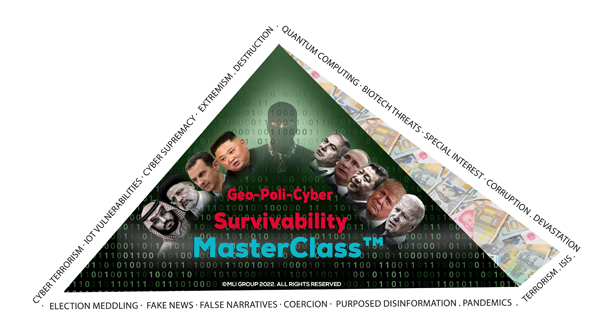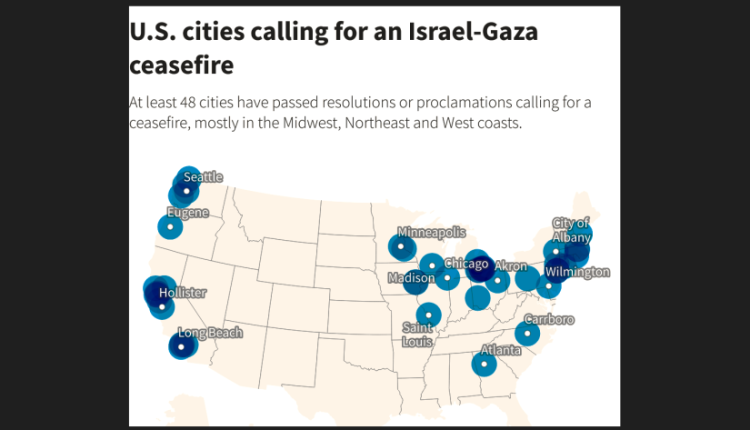“Stop Gaza Genocide” Tidal Wave Gaining Momentum. | About 70 US city councils call for Israel-Gaza ceasefire. | Is Biden Deaf, or Over Captured by Zionist & Israel’s Lobbies to Listen to American officials, citizens and voters?
“Stop Gaza Genocide” Tidal Wave Gaining Momentum.
According to Reuters, some 70 U.S. cities, including Chicago and Seattle, have passed resolutions on the Israel-Gaza war with most calling for a ceasefire, a Reuters analysis of city data shows, placing more pressure on President Joe Biden ahead of a November general election to help end the fighting.
At least 48 cities have passed symbolic resolutions calling for a halt to Israel’s Gaza bombardment, with six others passing resolutions advocating more broadly for peace. At least 20 have passed resolutions condemning Hamas’ Oct. 7 attack on Israel, which sparked the current bloodshed, the data shows.
Most of the ceasefire resolutions have passed in Democratic states like California, though at least 14 have passed in swing states like Michigan that could be decisive in Biden’s re-election bid against Republican former President Donald Trump.
Biden’s administration has rebuffed calls for a ceasefire, something supported by a majority of Americans, arguing that an Israeli halt would embolden Hamas. Critics of the city resolutions say they have no tangible effect on national policy and distract from domestic issues.
Gabriela Santiago-Romero, a Detroit council member who voted to pass a ceasefire resolution in Michigan’s biggest city in November, said it reflected frustration, particularly by younger officials and people of color, with Biden and other national Democratic party leaders.
“We want leadership that is willing to listen to us,” Santiago-Romero said.
Democrats should “listen to young people, invest in diversity, invest in people that are values aligned who actually listen to their constituents,” she added.
Asked for comment, the White House, which has said it is pressing Israel to avoid civilian casualties in Gaza, referred to previous statements that a ceasefire would only benefit Hamas.
On Wednesday, Chicago became the largest city to call for ceasefire in a tight vote where Mayor Brandon Johnson broke a 23-23 tie to get the resolution passed.
Reuters compiled data from 70 cities that have passed Israel-Gaza resolutions or proclamations since Oct. 7, when Hamas militants killed some 1,200 people in Israel and took 253 hostages, according to Israeli tallies. They range from major cities like San Francisco to smaller cities such as Carrboro, North Carolina, and Biden’s hometown of Wilmington, Delaware.
Many of the ceasefire calls are modeled after Missouri congresswoman Cori Bush’s “Ceasefire Now” resolution, which also urges the release of hostages and an increase of aid into Gaza, where health officials say Israeli bombardment has killed more than 26,600 Palestinians.
This (war) is something that’s going to be on voters’ minds,” said Douglas Wilson, a Democratic strategist in the swing state of North Carolina.
“It’s gonna be an issue here and in all the swing states because of the Muslim populations in these states, the Jewish populations in these states and the Black and brown population these states,” Wilson said.
‘TAKING A STANCE’
“We can’t have a ceasefire (with) a terrorist organization that’s committed to doing this again,” said Tyler Gregory, head of San Francisco’s Jewish Community Relations Council, which has condemned the calls as one-sided.
San Francisco Board Supervisor Hillary Ronen said hundreds of Jewish and Muslim residents urged her to vote in favor of a resolution that passed in the city, one of the largest to approve it.
“For people like me, Jewish people with family members in Israel, it’s extra important for us to take a stance against this war,” Ronen said.
Mohammed Khader, policy manager with U.S. Campaign for Palestinian Rights Action, said advocates “hope that those empowered with local state or federal voting power will acknowledge their Palestinian constituents.”
Analysts cautioned that while much could change before the Nov. 5 election, local frustration with Biden could hurt him at the polls by suppressing turnout.
Nadia Brown, a professor of government at Georgetown University, said that many Democratic activists “don’t see voting or doing things at a national level as a way to get things they like.”
Brown added: “And if they don’t see that now, will they see that in November? I don’t think so.”

